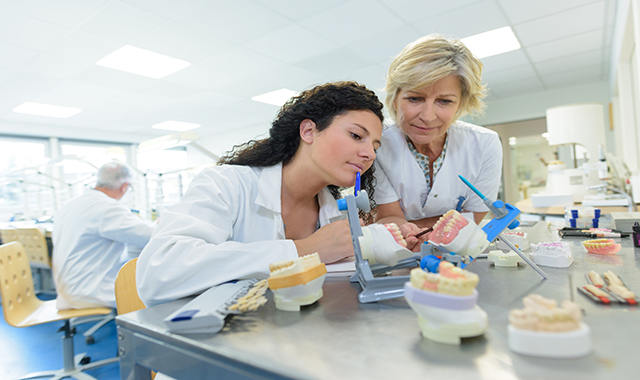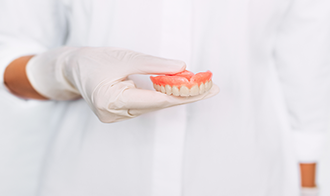Should You Order Dentures from Overseas?
Overseas labs can make dentures affordable, but dentists learn quickly that you get what you pay for.

If you need removable full or partial dentures, should you order them from an overseas lab? Travis Zick, President of the National Association of Dental Laboratories (NADL), says you can, but be sure that you know what materials they are using.
“The biggest concern working with a lab outside the United States is not knowing 100 percent what's in that restoration or that prosthetic device that you get back,” Zick says.
Many of you might be thinking, ‘Well, that’s okay. I use a local lab, so this doesn’t apply to me.’ When you place an order for dentures with the lab, they make it for you.
Or do they?
Zick, who is also Vice President and Chief Operating Officer of Apex Dental Laboratory Group, says many dentists don't know overseas labs made their restorations.
“There's a lot of domestic labs that send work to other countries that don't disclose it to the doctors,” Zick says.
The percent of work imported from another country and sold in the US peaked somewhere in the mid 40th percentiles during the Great Recession a few years ago. Zick says that number has come down and last year, it was in the mid-30th percentiles.
“But it's still a third of the work sold in the United States that was produced elsewhere,” Zick says. “I don't think a lot of dentists realize that.”
Part of the reason you might not know your work is produced out of the country is that few states require dental labs to disclose it to you. There is less governmental oversight for lab operations than most people realize.
Per the NADL’s website, the state governments that require dental labs to disclose the Point of Origin for your restoration are:
- Florida
- Illinois
- Kentucky
- Minnesota
- Missouri
- North Carolina
- Ohio
- South Carolina
- Texas
- Virginia
- Washington
Of these states, all but Texas require a material disclosure as well. However, most states do not require your lab to tell you the restoration was produced out of the country-or what is in it.
“The bottom line is a lot of labs are able to do things that they don't disclose or don't want to disclose,” Zick explains.
Zick says the only advantage typically to working with an overseas lab is price. Labor costs are lower than the US in most countries, so labor-intensive products, like removable dentures or partials, have a significant price difference.
Working with overseas labs has a couple of significant cons as well. One of the downsides per Zick is the longer turnaround times. With the shipping and potential customs hang-ups and other related issues, it’s going to take longer to go and come back. However, that isn’t the worst of it.
The concerns about what’s in the restoration exceed esthetics or function. The NADL has done blind tests in the past of materials purchased online from other countries. Zick says there are documented instances in the United States of work that's come in from other countries that contained lead or had radiation issues.
Continued on next page...
In 2008, an Ohio television station tested eight crowns made in a Chinese laboratory. The crowns contained 210 parts per million of lead.[i] Crowns should not contain lead at all, according to the American Dental Association (ADA). Moreover, the US set the acceptable lead level in toys at 90 parts per million, and toys don’t go into the oral cavity (at least not all the time). However, the FDA and the Centers for Disease Control and Prevention (CDC) said that the lead in crowns was not likely to cause a health risk.
Neither the ADA and the CDC have enough evidence to suggest that your patients are in danger from dental restorations made overseas, according to the Buffalo News. However, they cite a 2008 study that found unacceptable levels of lead in some crowns made in China.[ii]
Andy Jakson, the owner of the Evolution Dental Science Lab in New York, was working with a lab in China that he had toured personally back in the early 2000s. As part of their partnership, he sent them FDA approved materials for his restorations.
However, he grew suspicious about the restorations he was getting back. He had the Chinese lab’s restorations tested and learned that the Chinese lab did not use the FDA-materials he sent. Later, he learned the lab had sold his FDA materials on the black market and made his restorations with other materials.[iii]
While this incident is one lab owner’s experience and not an indictment of all overseas labs, it may be enough to give clinicians pause. In Jakson’s case, he had no recourse against the lab in China.
“Those are concerns. You just don’t know. You are not 100 percent sure what you are getting,” Zick says
At that time, Zick says the product mix and activities in domestic labs on the fixed side, were still metal-based. Labs produced many porcelain-fused-to-metal (PFM) crowns and full-cast crowns, which were still labor-intensive.
“So, doctors and labs were able to send work over to China, Vietnam, or some other countries to get those products with significant labor savings,” Zick says.

However, starting between 2012 to 2015 and forward to today, the product mix and the demand for products on the fixed side changed direction drastically, Zick says. The industry is moving away from metal-based crowns and PFMs to ceramic crowns, Zirconia, and lithium disilicate, among others. These crowns are less labor-intensive and more technology-driven. When you add in the advantage of working with domestic labs regarding turnaround time, Zick explains, the US-based labs could compete on price and bring some of that business back to the US.
“Between material costs and utilizing technology that reduces our hands-on time at domestic labs, we're able to offer more competitive pricing on those products,” Zick says.
An area where they still struggle to compete is with removables. While many labs are milling and 3D printing digital dentures, it is still not widely accepted or used. Today, Zick believes there are still limitations to the technology. However, in the next two or three years, there will be an increase in digitally produced removables, which will reduce the labor and hands-on time for those products.
“We're already doing it with a lot of our partial frames. A lot of those now are milled, and the metal frames are even 3D printed. So, we've been able to introduce some technology there. But up until two or three years ago, all the technology advances in the lab business were focused on the fixed side,” Zick says.
Continued on next page...
Digital technology is focusing on removables and implants to reduce the labor involved in production techniques. However, part of the reason is a lack of talent in the lab industry for these products. Zick says they have the same number of technicians they did 15 years ago, but the demand for their services is much higher. Technicians who are experts in removables have suffered even higher decreases in the talent pool than general lab technicians.
“Denture technicians are becoming a lost breed, and that's driving us to utilize more technology,” Zick says.
However, there are significant disadvantages to working with an overseas lab for full dentures. Dentures take multiple appointments to ensure they fit and function properly. If the prosthesis goes back and forth to a foreign lab a couple of times, it could take months instead of weeks to deliver the final product.
“On top of that, communication is where a lot of the real barriers come in. If you have to talk to the technician about the case and work together, it can be a real challenge,” Zick says.
Few dentists are sending their lab work overseas directly, Zick says. Most of the overseas work goes through a domestic lab, and some labs will tell you, but others will not. Zick advises dentists to demand lab point of origin and material disclosures on everything that they do, whether it's the denture or a crown.
“Tell me where it's being made, who's making it, and what's in it. Dentists need to demand those things,” Zick says. “Now, in several states, that's law. That's a requirement. But in the majority of states, it's not. “
Furthermore, Zick says, there are certain “tells” if the lab is not being honest. The most obvious is the turnaround time. So, if a lab tells you it's going to take two weeks to get you a setup, it is probably not being done in their lab, Zick says. The second one is the price.
“Denture technicians in the United States are not cheap. So, if you're getting a denture, that seems like it's too good of a deal, it probably is,” Zick says.
As president of the NADL, Zick says it is crucial to work with certified dental technicians (CDT) and certified dental labs (CDL) in the US rather than overseas labs. He encourages dentists to seek out certified dental labs in the US, DAMAS (Dental Appliance Manufacturers Audit System) labs or ISO (International Organization of Standardization) labs. These labs and technicians have earned accreditation and have quality systems in place.
“They know the basics of what they're doing, and they're following proper regulation, protocols, and procedures,” Zick says of accredited labs. “There's a lot of advantages to working with quality, well-trained domestic dental technicians, especially a CDT that can provide local service, local support and work together, collaboratively on patient care.”
To locate a CDL in your area, visit the tool on the NADL’s website.
[i]
Howard, Lee. “Lead in Dental Work Prompts Fears About Chinese-Made Crowns, Bridges.” www.Today.uchc.edu. From Article in
New London Day,
April 28, 2008. Web. 6 September 2019
.
<
https://today.uchc.edu/headlines/2008/apr08/dental_work.html
>.
[ii] Tan, Sandra. “Were your dentures, crowns made in China? Law would require disclosure.” Buffalonews.com. 11 July 2017. Web. 6 August 2019. < https://buffalonews.com/2017/07/11/law-give-patients-info-dental-crowns-bridges-made/>.
[iii] Ibid.